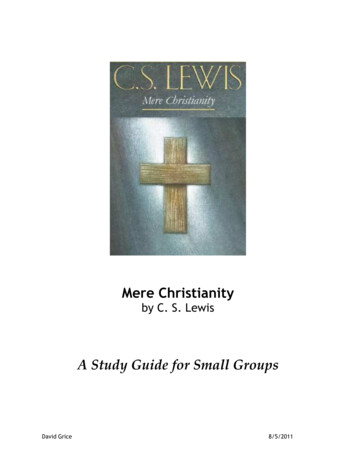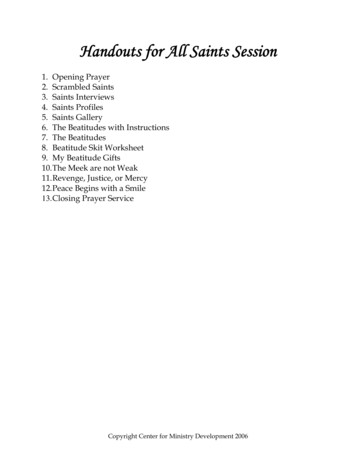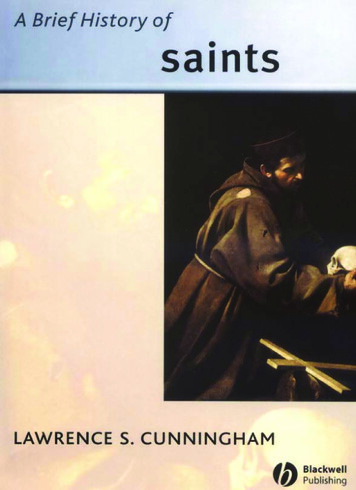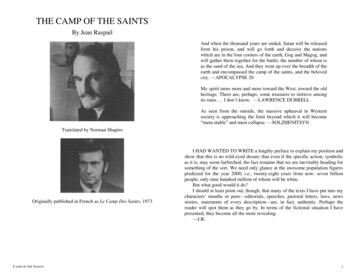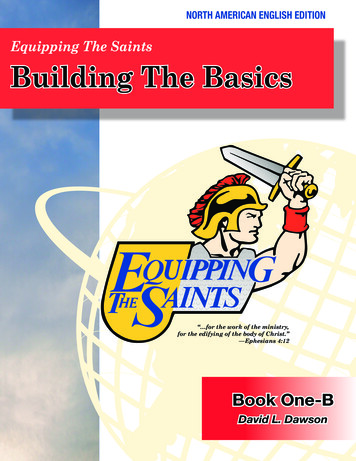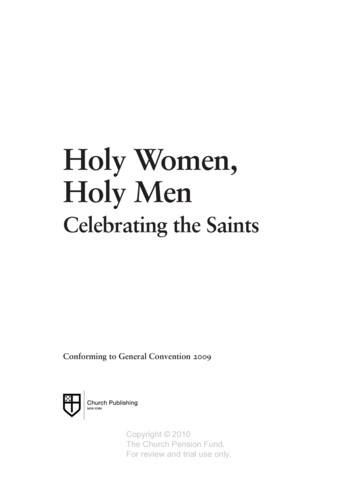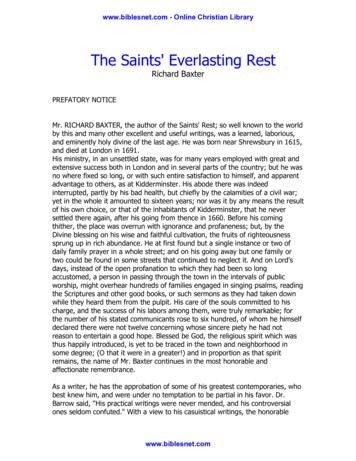
Transcription
www.biblesnet.com - Online Christian LibraryThe Saints' Everlasting RestRichard BaxterPREFATORY NOTICEMr. RICHARD BAXTER, the author of the Saints' Rest; so well known to the worldby this and many other excellent and useful writings, was a learned, laborious,and eminently holy divine of the last age. He was born near Shrewsbury in 1615,and died at London in 1691.His ministry, in an unsettled state, was for many years employed with great andextensive success both in London and in several parts of the country; but he wasno where fixed so long, or with such entire satisfaction to himself, and apparentadvantage to others, as at Kidderminster. His abode there was indeedinterrupted, partly by his bad health, but chiefly by the calamities of a civil war;yet in the whole it amounted to sixteen years; nor was it by any means the resultof his own choice, or that of the inhabitants of Kidderminster, that he neversettled there again, after his going from thence in 1660. Before his comingthither, the place was overrun with ignorance and profaneness; but, by theDivine blessing on his wise and faithful cultivation, the fruits of righteousnesssprung up in rich abundance. He at first found but a single instance or two ofdaily family prayer in a whole street; and on his going away but one family ortwo could be found in some streets that continued to neglect it. And on Lord'sdays, instead of the open profanation to which they had been so longaccustomed, a person in passing through the town in the intervals of publicworship, might overhear hundreds of families engaged in singing psalms, readingthe Scriptures and other good books, or such sermons as they had taken downwhile they heard them from the pulpit. His care of the souls committed to hischarge, and the success of his labors among them, were truly remarkable; forthe number of his stated communicants rose to six hundred, of whom he himselfdeclared there were not twelve concerning whose sincere piety he had notreason to entertain a good hope. Blessed be God, the religious spirit which wasthus happily introduced, is yet to be traced in the town and neighborhood insome degree; (O that it were in a greater!) and in proportion as that spiritremains, the name of Mr. Baxter continues in the most honorable andaffectionate remembrance.As a writer, he has the approbation of some of his greatest contemporaries, whobest knew him, and were under no temptation to be partial in his favor. Dr.Barrow said, "His practical writings were never mended, and his controversialones seldom confuted." With a view to his casuistical writings, the honorablewww.biblesnet.com
www.biblesnet.com - Online Christian LibraryRobert Boyle declared, "He was the fittest man of the age for a casuist, becausehe feared no man's displeasure, nor hoped for any man's preferment." BishopWilkins observed of him, "that he had cultivated every subject he had handled;that if he had lived in the primitive times, he would have been one of the fathersof the church; and that it was enough for one age to produce such a person asMr. Baxter." Archbishop Usher had such high thoughts of him, that by his earnestimportunity he put him upon writing several of his practical discourses,particularly that celebrated piece, his Call to the Unconverted. Dr. Manton, as hefreely expressed it, "thought Mr. Baxter came nearer the apostolical writings thanany man in the age." And it is both as a preacher and a writer that Dr. Batesconsiders him, when, in his funeral sermon he says, "In his sermons there was arare union of arguments and motives to convince the mind and gain the heart.All the fountains of reason and persuasion were open to his discerning eye.There was no resisting the force of his discourses, without denying reason anddivine revelation. He had a marvellous facility and copiousness in speaking.There was a noble negligence in his style, for his great mind could not stoop tothe affected eloquence of words; he despised flashy oratory, but his expressionswere clear and powerful; so convincing the understanding, so entering into thesoul, so engaging the affections, that those were as deaf as adders who werenot charmed by so wise a charmer. He was animated with the Holy Spirit, andbreathed celestial fire, to inspire heat and life into dead sinners, and to melt theobdurate in their frozen tomb. His books, for their number, (which it seems weremore than one hundred and twenty,) and variety of matter in them, make alibrary. They contain a treasure of controversial, casuistical, and practical divinity.His books of practical divinity have been effectual for more numerousconversions of sinners to God, than any printed in our time; and while the churchremains on earth, will be of continual efficacy to recover lost souls. There is avigorous pulse in them, that keeps the reader awake and attentive." To thesetestimonies may not improperly be added that of the editors of his practicalworks in four folio volumes; in the preface to which they say, "Perhaps there areno writings among us that have more of a true Christian sprit, a greater mixtureof judgment and affection, or a greater tendency to revive pure and undefiledreligion; that have been more esteemed abroad, or more blessed at home, forawakening the secure, instructing the ignorant, confirming the wavering,comforting the dejected, recovering the profane, or improving such as are trulyserious, than the practical works of this author." Such were the apprehensions ofeminent persons who were well acquainted with Mr. Baxter and his writings. It istherefore the less remarkable that Mr. Addison, from an accidental and veryimperfect acquaintance, but with his usual pleasantness and candor, shouldmention the following incident: "I once met with a page of Mr. Baxter. Upon theperusal of it I conceived so good an idea of the author's piety that I bought thewhole book."www.biblesnet.com
www.biblesnet.com - Online Christian LibraryWhatever other causes might concur, it must chiefly be ascribed to Mr. Baxter'sdistinguished reputation as a preacher and a writer, that, presently after theRestoration, he was appointed one of the chaplains in ordinary to King CharlesII. and preached once before him in that capacity; as also that he had an offermade him, by Lord Chancellor Clarendon, of the bishopric of Hereford, which, ina respectful letter to his lordship, he saw proper to decline.The Saints' Rest is deservedly esteemed one of the most valuable parts of hispractical works. He wrote it when he was far from home, without any book toconsult but his Bible, and in such an ill state of health as to be in continualexpectation of death for many months; and therefore, merely for his own use, hefixed his thoughts on this heavenly subject, "which," says he, "hath morebenefitted me than all the studies of my life." At this time he could be little morethan thirty years old. He afterwards preached over the subject in his weeklylecture at Kidderminster, and in 1650 published it; indeed it appears to havebeen the first that ever he published of all his practical writings. Of this book Dr.Bates says, "It was written by him when languishing in the suspense of life anddeath, but has the signatures of his holy and vigorous mind. To allure ourdesires, he unveils the sanctuary above, and discovers the glories and joys of theblessed in the Divine presence, by a light so strong and lively, that all theglittering vanities of this world vanish in the comparison, and a sincere believerwill despise them, as one of mature age does the toys and baubles of children.To excite our fear, he removes the screen, and makes the everlasting fire of hellso visible, and represents the tormenting passions of the damned in suchdreadful colors, as, if duly considered, would check and control the unbridled,licentious appetites of the most sensual wretches."Heavenly rest is a subject in its own nature so universally important andinteresting, and at the same time so truly engaging and delightful, as sufficientlyaccounts for the great acceptance which this book has met with; and partly, also,for the uncommon blessing which has attended Mr. Baxter's manner of treatingthe subject, both from the pulpit and the press. For where are the operations ofDivine grace more reasonably to be expected, or where have they, in fact, beenmore frequently discerned, than in concurrence with the best adapted means?And should it appear that persons of distinguishing judgment and piety haveexpressly ascribed their first religious impressions to the hearing or reading theimportant sentiments contained in this book; or, after a long series of years,have found it both the counterpart and the improvement of their own divine life;will not this be thought a considerable recommendation of the book itself?Among the instances of persons that dated their true conversion from hearingthe sermons on the Saints' Rest when Mr. Baxter first preached them, was theRev. Thomas Doolittle, M. A. who was a native of Kidderminster, and at that timea scholar about seventeen years old, whom Mr. Baxter himself afterward sent towww.biblesnet.com
www.biblesnet.com - Online Christian LibraryPembroke Hall, in Cambridge, where he took his degree. Before his going to theuniversity, he was upon trial as an attorney's clerk, and under that character,being ordered by his master to write something on a Lord's day, he obeyed withgreat reluctance, and the next day returned home, with an earnest desire that hemight not apply himself to any thing, as the employment of life, but servingChrist in the ministry of the Gospel. His praise is yet in the churches, for hispious and useful labors as a minister, a tutor and a writer.In the life of the Rev. John Janeway, Fellow of King's College, Cambridge, whodied in 1657, we are told that his conversion was, in a great measure,occasioned by his reading the Saints' Rest. And in a letter which he afterwardswrote to a near relative, speaking with a more immediate reference to that partof the book which treats of heavenly contemplation, he says, "There is a duty,which, if it were exercised, would dispel all cause of melancholy: I meanheavenly meditation and contemplation of the things to which the true Christianreligion tends. If we did but walk closely with God one hour in a day in this duty,O what influence would it have upon the whole day besides, and, dulyperformed, upon the whole life! This duty, with its usefulness, manner, anddirections, I knew in some measure before, but had it more pressed upon me byMr. Baxter's Saints' Everlasting Rest, a book that can scarce be overvalued, andfor which I have cause for ever to bless God." This excellent young minister's lifeis worth reading, were it only to see how delightfully he was engaged inheavenly contemplation, according to the directions in the Saints' Rest.It was the example of heavenly contemplation, at the close of this book, whichthe Rev. Joseph Alleine so frequently quoted in conversation, with this solemnintroduction, "Most divinely says that man of God, holy Mr. Baxter."Dr. Bates, in his funeral sermon, dedicated to Sir Henry Ashurst, says to thatreligious gentleman and most distinguished friend and executor of Mr. Baxter,"He was most worthy of your highest esteem and love; for the first impressionsof heaven upon your soul were in reading his invaluable book of the Saints'Everlasting Rest."In the life of the Rev. Matthew Henry we have the following character given usof Robert Warburton, Esq. of Grange, the son of the eminently religious JudgeWarburton, and the father of Mr. Matthew Henry's second wife. "He was agentlemen that greatly affected retirement and privacy, especially in the latterpart of his life; the Bible and Mr. Baxter's Saints' Everlasting Rest used to lie dailybefore him on the table in his parlor; he spent the greatest part of his time inreading and prayer."In the life of that honorable and most religious knight Sir Nathaniel Barnardiston,we are told that "he was constant in secret prayer and reading the Scriptures;www.biblesnet.com
www.biblesnet.com - Online Christian Libraryafterwards he read other choice authors; but not long before his death he took asingular delight in reading Mr. Baxter's Saints' Everlasting Rest and preparationsthereunto; which was esteemed a gracious event of Divine Providence, sending itas a guide to bring him more speedily and directly to that rest."Besides persons of eminence, to whom this book has been precious andprofitable, we have an instance, in the Rev. James Janeway's Token for Children,of a little boy, whose piety was so discovered and promoted by reading it, as themost delightful book to him, next to the Bible, that the thoughts of everlastingrest seemed, even while he continued in health, to swallow up all otherthoughts; and he lived in a constant preparation for it, and appeared more likeone that was ripe for glory, than an inhabitant of this lower world. And when hewas in the sickness of which he died before he was twelve years old, he said, "Ipray, let me have Mr. Baxter's book, that I may read a little more of eternitybefore I go into it."Nor is it less observable that Mr. Baxter himself, taking notice, in a paper foundin his study after his death, what a number of persons were converted byreading his Call to the Unconverted, accounts of which he had received by letterevery week, expressly adds, "This little book, the Call to the Unconverted, Godhath blessed with unexpected success, beyond all that I have written, except theSaints' Rest." With an evident reference to this book, and even during the life ofthe author, the pious Mr. Flavel affectionately says, "Mr. Baxter is almost inheavenliving in the daily views and cheerful expectation of the saints' everlastingrest with God; and is left for a little while among us, as a great example of thelife of faith." And Mr. Baxter himself says, in his preface to his Treatise ofSelfDenial, "I must say, that of all the books which I have written, I peruse noneso often for the use of my own soul in its daily work, as my Life of Faith, this ofSelfDenial, and the last part of the Saints' Rest." On the whole, it is not withoutgood reason that Dr. Calamy remarks concerning it, "This is a book for whichmultitudes will have cause to bless God for ever."This excellent and useful book now appears in the form of an abridgment andtherefore, it is presumed, will be the more likely, under the Divine blessing, todiffuse its salutary influence among those that would otherwise have wantedopportunity or inclination to read over the larger volume. In reducing it to thissmaller size, I have been very desirous to do justice to the author, and at thesame time promote the pleasure and profit of the serious reader. And I hopethese ends are in some measure answered; chiefly by dropping things of adigressive, controversial, or metaphysical nature; together with prefaces,dedications, and various allusions to some peculiar circumstances of the last age;and particularly by throwing several chapters into one, that the number of themmay better correspond with the size of the volume; and sometimes by alteringthe form, but not the sense, of a period, for the sake of brevity; and when anwww.biblesnet.com
www.biblesnet.com - Online Christian Libraryobsolete phrase occurred, changing it for one more common and intelligible. Ishould never have thought of attempting this work, if it had not been suggestedand urged by others; and by some very respectable names, of whose learning,judgment and piety I forbear to avail myself. However defective this performancemay appear, the labor of it (if it may be called a labor) has been, I bless God,one of the most delightful labors of my life.Certainly the thoughts of everlasting rest may be as delightful to souls in thepresent day, as they have ever been to those of past generations. I am suresuch thoughts are as absolutely necessary now; nor are temptations to neglectthem either fewer or weaker than formerly. The worth of everlasting rest is notfelt, because a thousand trifles are preferred before it. But were the divinereasonings of this book duly attended to, (and O that the Spirit and grace of theRedeemer may make them so!) then an age of vanity would become serious;minds enervated by sensuality would soon resume the strength of reason, anddisplay the excellence of Christianity; the delusive names of pleasure would beblotted out by the glorious reality of heavenly joy upon earth; every station andrelation in life would be filled up with the propriety and dignity of seriousreligion; every member of society would then effectually contribute to the beautyand happiness of the whole; and every soul would be ready for life or death, forone world or another, in a wellgrounded and cheerful persuasion of havingsecured a title to that rest which remaineth to the people of God.B.F. KIDDERMINSTER, Dec. 25th, 1758.THE SAINTS' EVERLASTING REST."There remaineth therefore a rest unto the people of God."Hebrews, 4:9.CHAPTER I.THE INTRODUCTION TO THE WORK, WITH SOME ACCOUNT OF THE NATUREOF THE SAINTS' REST.The important design of the apostle in the text, to which the author earnestlybespeaks the attention of the reader. The saints' rest defined, with a generalplan of the work. That this rest presupposes. The author's humble sense of hiswww.biblesnet.com
www.biblesnet.com - Online Christian Libraryinability fully to show what this rest contains. It contains, 1. A ceasing frommeans of grace; 2. A perfect freedom from all evils; 3. The highest degree of thesaints' personal perfection, both in body and soul; 4. The nearest enjoyment ofGod, the chief good; 5. A sweet and constant action of all the powers of soul andbody in this enjoyment of God.It was not only our interest in God, and actual enjoyment of him, which was lostin Adam's fall, but all spiritual knowledge of him, and true disposition towardssuch a felicity. When the Son of God comes with recovering grace, anddiscoveries of a spiritual and eternal happiness and glory, he finds not faith inman to believe it. As the poor man, that would not believe any one had such asum as a hundred pounds, it was so far above what he himself possessed, somen will hardly now believe there is such a happiness as once they had, muchless as Christ hath now procured. When God would give the Israelites hisSabbaths of rest, in a land of rest, it was harder to make them believe it, than toovercome their enemies, and procure it for them. And when they had it, only asa small intimation and earnest of an incomparably more glorious rest throughChrist, they yet believe no more than they possess, but say, with the epicure atthe feast, Sure there is no other heaven but this! or, if they expect more by theMessiah, it is only the increase of their earthly felicity. The apostle aims most ofthis Epistle against this obduracy, and clearly and largely proves that the end ofall ceremonies and shadows is to direct them to Jesus Christ, the substance; andthat the rest of Sabbaths, and Canaan, should teach them to look for a furtherrest, which indeed is their happiness. My text is his conclusion after diversarguments; a conclusion which contains the ground of all the believer's comfort,the end of all his duty and sufferings, the life and sum of all gospel promises andChristian privileges.What more welcome to men under personal afflictions, tiring duties,disappointments, or sufferings, than rest? It is not our comfort only, but ourstability. Our liveliness in all duties, our enduring of tribulation, our honoring ofGod, the vigor of our love, thankfulness, and all our graces; yea, the very beingof our religion and Christianity depend on the believing, serious thoughts of ourrest. And now, reader, whoever thou art, young or old, rich or poor, I entreatthee, and charge thee, in the name of thy Lord, who will shortly call thee to areckoning, and judge thee to thy everlasting, unchangeable state, that thou givenot these things the reading only, and so dismiss them with a bare approbation;but that thou set upon this work, and take God in Christ for thy only rest, and fixthy heart upon him above all. May the living God, who is the portion and rest ofhis saints, make these our carnal minds so spiritual, and our earthly hearts soheavenly that loving him, and delighting in him, may be the work of our lives;and that neither I that write, nor you that read this book, may ever be turnedwww.biblesnet.com
www.biblesnet.com - Online Christian Libraryfrom this path of life; "lest, a promise being left us of entering into his rest," weshould "come short of it," through our own unbelief or negligence.The saints' rest is the most happy state of a Christian; or, it is the perfect endlessenjoyment of God by the perfected saints, according to the measure of theircapacity, to which their souls arrive at death, and both soul and body most fullyafter the resurrection and final judgment. According to this definition of thesaints' rest, a larger account of its nature will be given in this chapter; of itspreparatives, chap. 2; its excellencies, chap. 3 and chap. 4, the persons forwhom it is designed. Further to illustrate the subject, some description will begiven, chap. 5, of their misery who lose this rest; and chap. 6, who also lose theenjoyments of time, and suffer the torments of hell. Next will be shown, chap. 7,the necessity of diligently seeking this rest; chap. 8, how our title to it may hediscerned; chap. 9, that they who discern their title to it should help those thatcannot; and chap. 10, that this rest is not to be expected on earth. It will then beproper to consider, chap. 11, the importance of a heavenly life upon earth; chap.12, how to live a heavenly life upon earth; chap. 13, the nature of heavenlycontemplation, with the time, place and temper most fit for it; chap. 14, whatuse heavenly contemplation makes of consideration, affections, soliloquy andprayer: and likewise, chap. 15, how heavenly contemplation may be assisted bysensible objects, and guarded against a treacherous heart. Heavenlycontemplation will be exemplified, chap. 16, and the whole work concluded.There are some things necessarily presupposed in the nature of this rest: as,That mortal men are the persons seeking it. For angels and glorified spirits haveit already, and the devils and damned are past hope:That they choose God only for their end and happiness. He that takes any thingelse for his happiness is out of the way the first step:That they are distant from this end. This is the woful case of all mankind sincethe fall. When Christ comes with regenerating grace, he finds no man sitting still,but all posting to eternal ruin, and making haste toward hell; till, by conviction,he first brings them to a stand, and then, by conversion, turns their hearts andlives sincerely to himself. This end, and its excellency, is supposed to be known,and seriously intended. An unknown good moves not to desire or endeavor. Andnot only a distance from this rest, but the true knowledge of this distance, is alsosupposed. They that never yet knew they were without God, and in the way tohell, never yet knew the way to heaven. Can a man find he hath lost his God andhis soul, and not cry, I am undone? The reason why so few obtain this rest, is,they will not be convinced that they are, in point of title, distant from it and, inpoint of practice, Contrary to it. Who ever sought for that which he knew not hehad lost? "They that be whole need not a physician, but they that are sick:"www.biblesnet.com
www.biblesnet.com - Online Christian LibraryThe influence of a superior moving Cause is also supposed; else we shall allstand still, and not move toward our rest. If God move us not, we cannot move.It is a most necessary part of our Christian wisdom, to keep our subordination toGod, and dependence on him. "We are not sufficient of ourselves to think anything as of ourselves, but our sufficiency is of God." "Without me," says Christ,"ye can do nothing."It is next supposed, that they who seek this rest have an inward principle ofspiritual life. God does not move men like stones, but he endows them with life,not to enable them to move without him, but in subordination to himself, thefirst mover.And further, this rest supposes such an actual tendency of soul toward it as isregular and constant, earnest and laborious. He that hides his talent shall receivethe wages of a slothful servant. Christ is the door, the only way to this rest. "Butstrait is the gate and narrow is the way;" and we must strive, if we will enter; for"many will seek to enter in, and shall not be able; which implies, "that thekingdom of heaven suffereth violence." Nor will it bring us to the end of thesaints, if we begin in the spirit and end in the flesh. He only "that endureth tothe end shall be saved." And never did a soul obtain rest with God whose desirewas not set upon him above all things else in the world. "Where your treasure is,there will your heart he also." The remainder of our old nature will much weakenand interrupt these desires, but never overcome them. And, considering theopposition to our desires, from the contrary principles in our nature, and fromthe weakness of our graces, together with our continued distance from the end,our tendency to that end must be laborious, and with all our might. All thesethings are presupposed, in order to a Christian's obtaining an interest in heavenlyrest.Now we have ascended these steps into the outward court, may we look withinthe veil? May we show what this rest contains, as well as what it presupposes?Alas! how little know I of that glory! The glimpse which Paul had, contained whatcould not, or must not, be uttered. Had he spoken the things of heaven in thelanguage of heaven, and none understood that language, what the better? TheLord reveal to me what I may reveal to you! The Lord open some light, andshow both you and me our inheritance! Not as to Balaam only, whose eyes wereopened to see the goodliness of Jacob's tents, and Israel's tabernacles, where hehad no portion, and from whence must come his own destruction; not as toMoses, who had only a discovery instead of possession, and saw the land whichhe never entered; but as the pearl was revealed to the merchant in the Gospel,who rested not till he had sold all he had, and bought it; and as heaven wasopened to blessed Stephen, which he was shortly to enter, and the glory showedhim which should be his own possession.www.biblesnet.com
www.biblesnet.com - Online Christian LibraryThe things contained in heavenly rest are such as these: a ceasing from meansof grace; a perfect freedom from all evils; the highest degree of the saints'personal perfection, both of body and soul; the nearest enjoyment of God, thechief good and a sweet and constant action of all the powers of body and soul inthis enjoyment of God.1. One thing contained in heavenly rest, is, the ceasing from means of grace.When we have obtained the haven, we have done sailing. When the workmanreceives his wages, it is implied he has done his work. When we are at ourjourney's end, we have done with the way. Whether prophecies, they shall fail;whether tongues, they shall cease; whether knowledge, it also, so far as it hadthe nature of means, shall vanish away. There shall be no more prayer, becauseno more necessity, but the full enjoyment of what we prayed for: neither shallwe need to fast, and weep, and watch any more, being out of the reach of sinand temptations. Preaching is done; the ministry of man ceases; ordinancesbecome useless; the laborers are called in, because the harvest is gathered, thetares burned, and the work finished; the unregenerate past hope, and the saintspast fear, for ever.2. There is in heavenly rest a perfect freedom from all evils: from all the evilsthat accompanied us through our course, and which necessarily follow ourabsence from the chief good, besides our freedom from those eternal flames andrestless miseries which the neglecters of Christ and grace must for ever endure;a woful inheritance, which, both by birth and actual merit, was due to us as wellas to them! In heaven there is nothing that defileth or is unclean. All thatremains without. And doubtless there is not such a thing as grief and sorrowknown there; nor is there such a thing as a pale face, a languid body, feeblejoints, helpless infancy, decrepid age, peccant humors, painful or pining sickness,griping fears, consuming cares, nor whatsoever deserves the name of evil. Wewept and lamented when the world rejoiced but our sorrow is turned to joy, andour joy shall no man take from us.3. Another ingredient of this rest is, the highest degree of the saints' personalperfection, both of body and soul. Were the glory ever so great, and themselvesnot made capable of it by a personal perfection suitable thereto, it would be littleto them. "Eye hath not seen, nor ear heard, neither have entered into the heartof man, the things which God hath prepared for them that love him." For the eyeof flesh is not capable of seeing them, nor this ear of hearing them, nor thisheart of understanding them: but there, the eye, and ear, and heart are madecapable; else, how do they enjoy them? The more perfect the sight is, the moredelightful the beautiful object. The more perfect the appetite, the sweeter thefood. The more musical the ear, the more pleasant the melody. The more perfectthe soul, the more joyous those joys, and the more glorious, to us, is that glory.www.biblesnet.com
www.biblesnet.com - Online Christian Library4. The principal part of this rest is our nearest enjoyment of God, the chief good.And here, reader, wonder not if I be at a loss, and if my apprehensions receivebut little of that which is in my expressions. If it did not appear to the beloveddisciple what we shall be, but only, in general, "that when Christ shall appear weshall be like him," no wonder if I kno
The Saints' Everlasting Rest Richard Baxter PREFATORY NOTICE Mr. RICHARD BAXTER, the author of the Saints' Rest; so well known to the world by this and many other excellent and useful writings, was a learned, laborious, and eminently holy divine of the last age. He was
